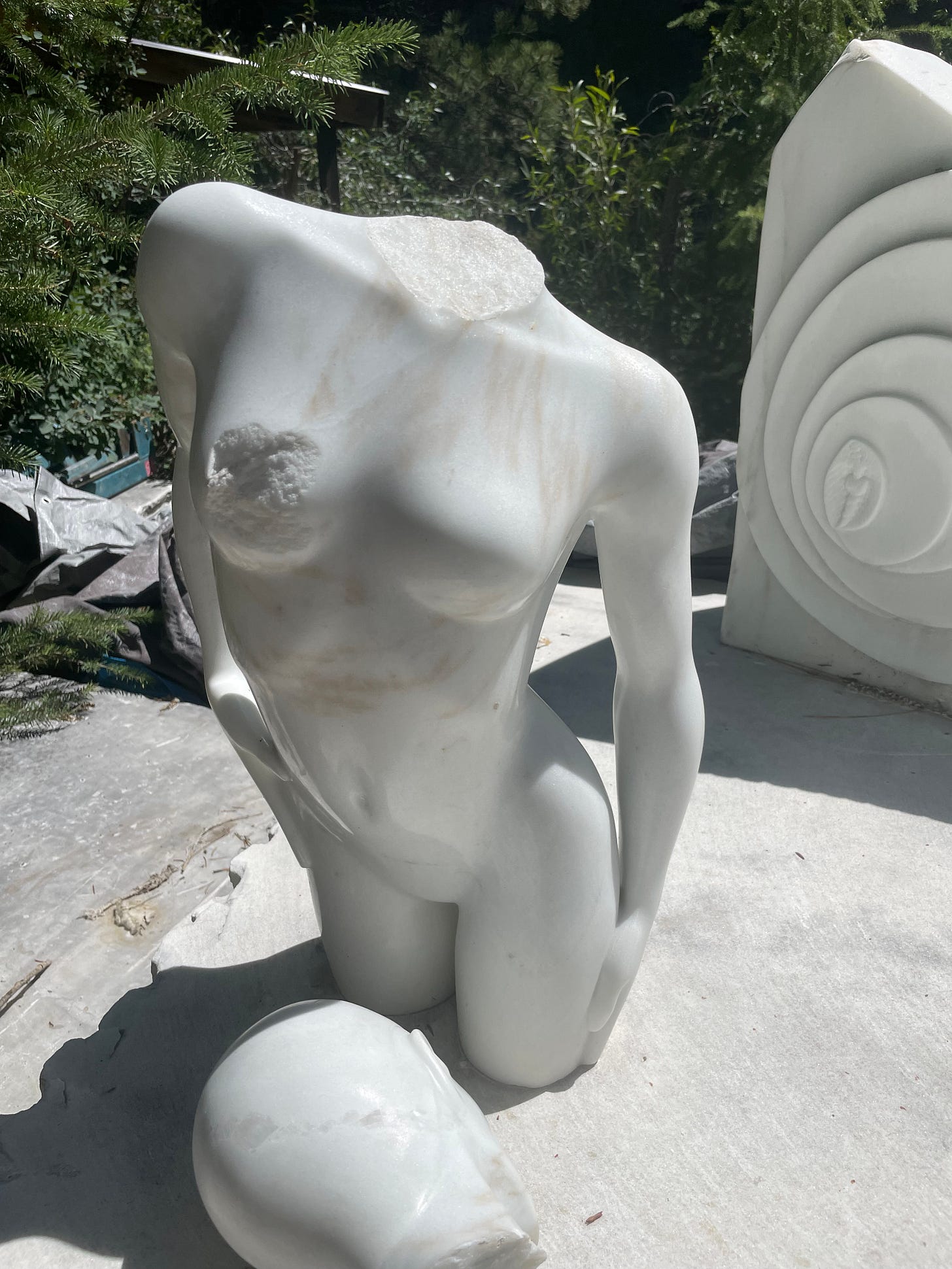While at the Marble Sculpting symposium in Marble, CO, I saw many masterpieces, but my favorite of all the sculptures was this one—the head broken off, the breast rough and chipped. It is, perhaps, not so strange in light of the Japanese aesthetic of wabi-sabi, beauty that embraces transience and imperfection.
Preview: Episode 46 on Failure
You take on a project you really don’t have time for, and the results are not so good. You have a creative project you don’t have the skills for yet. You have a kind of flimsy idea for a project, and decide to go ahead with it anyway. All of these are examples of situations that might not lead to success. But you’re in—what do you do now? In this episode, Rosemerry and Christie draw on Twyla Tharp’s book The Creative Habit: Learn It and Use It for Life. We discuss multiple kinds of failure that Tharp outlines—how we’ve experienced it and more importantly, how we’ve moved through it. We also talk about change, public vs. private failure, the importance of great titles (and how great titles can help you early on) and divergent thinking as a predictor of creativity.
What We’re Reading and Listening to:
Rosemerry:
Oh friends—we talk all the time about practice, trust, and collaboration as vital to the emerging form, and for a gorgeous, goosebump-producing work of art that brings all this together, watch the unrehearsed masterpiece of Jon Batiste and Corrine Bailey performing Nat King Cole’s “The Very Thought of You.”
“Why ask art into a life at all, if not to be transformed and enlarged by its presence and mysterious means?” This question is from the forward of Jane Hirshfield’s book of essay, Ten Windows: How great Poems Transform the World. I’ve had this book for years and recently picked it up again. I love her clear, intelligent, heartfelt writing about poetry, writing, and what it is to be alive.
Christie:
Chris Heath’s story in the Atlantic investigating what really happened with the Amazon mystery seeds is amazing story telling and also just a mind-boggling story about how stories spread and how we decide what’s true. I can’t stop thinking about it.
I’m reading Anna Sale’s new book, Let’s Talk About Hard Things, in which she talks about conversations regarding death, sex, money, family and identity. Most of the interviews and conversations were done specifically for the book, but she includes some excerpts from her podcast, Death, Sex & Money too.
My friend Adam Rogers has a new book out, Full Spectrum: How the Science of Color Made Us Modern, and now I am totally obsessed with Vantablack, which stands for “vertically aligned nanotubules, black.” “When you look at something coated in Vantablack, or take a picture of it, you see only a void,” Rogers writes.
When It Rains
So. On the same day we recorded this episode on failure, I wrote a poem about second chances. In the poem, I write about NBA great Michael Jordan and his take on how “failure” was a stepping stone for success. When I sent it out, I didn’t yet realize I’d spelled his name wrong in the poem. Twice. Oops. Talk about perfect for a poem about making mistakes! Even funnier because the day before I had sent out a poem about how people so often misspell my name! Hello humble pie! So I sent out a new version the next morning, correcting the misspelling of his name, grateful for the second chance! The irony? In the letter with the corrected version, I said that Michael Jordon was named one of the players best in the MBA.
Um. Yeah. And so, to celebrate failure, mistakes, humility and laughing at the self when the stakes just aren’t that high, here’s the poem that was in part inspired by Christie’s and my conversation about failure.
No Slam Dunk, But
Every day, a second chance—
as if all of life before has been one big shot
and today, I get to try again. Get to
forgive. Get to be kind. Get to let go,
be open, be gentle with myself.
Get to learn, unlearn, play again.
I think of Michael Jordan, and though
I know nothing of basketball, I know
he missed more than nine thousand shots
and lost nearly three hundred games and missed
the winning shot twenty-six times.
I know Michael Jordan was named by the NBA
as the greatest player of all time.
Every morning, though I can’t dribble
or shoot any more than I can flap my arms
and fly, I step onto the court of the new day
and let myself take the next shot. And miss.
And take the next shot again. Every day,
a new foul. Every day I want to argue with the ref.
Every day, I realize it does no good to argue.
At the end of the day, I see how I am the basket,
the ball, the bounce, the pass, the MVP,
the sub, the booing, the cheers.
I am the one who keeps score. And I am
the one who marvels when,
sweet miracle, the score is reset to zero,
and I’m given another chance—how is it?—
to make the winning shot.
A Note About Paid Subscriptions:
First, we want to thank ALL our subscribers! We are so grateful you join us in this conversation about what it is to engage with yourself, the world and others in a creative way. And a BIG thank you to our paid subscribers. You make this podcast possible. Starting this month, only our paid subscribers will receive our bonus episodes as a thank you for their financial support. If you are not yet a paid subscriber, you can go now to our website, EmergingForm.substack.com or by clicking the button below. Thank you!
Two Questions:
(share your answers with us here on Substack or in our FB group)
How do you define failure?
Describe a recent failure and how you moved through it.




